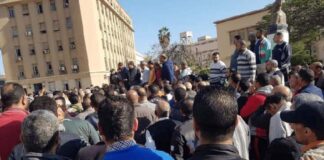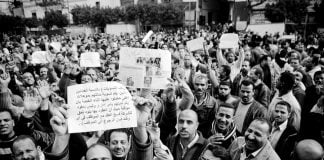Millions of people continue to radicalise as Egypt’s revolution moves left. Activists occupied Tahrir Square in central Cairo in July and similar public squares across Egypt, pledging to stay there until their demands are meet.
Millions more have mobilised to support them, creating a deep crisis for the government. Fourteen ministers in the civilian government that fronts the military regime have been replaced, while the Prime Minister, Essam Sharaf, was hospitalised for a short period due to stress.
But there are growing fears the military will launch a crackdown, after troops and gangs of plainclothes police attacked a march in Cairo at the end of July. Over 300 were injured as they were attacked with knives and swords, and thugs threw bricks and firebombs.
As Solidarity went to press the Muslim Brotherhood, which is backing the military government, had announced a mobilisation to defend the government.
Following the fall of Mubarak in February it was almost taboo to criticise the military leadership who were handed power. They were seen as national heroes for not using force on demonstrators, and for forcing Mubarak to leave. But six months later many millions are deeply frustrated with the slow pace of change.
“Determination Friday” on July 8 was the biggest mobilisation since the fall of Mubarak. Hundreds of thousands rallied in Cairo’s Tahrir Square, and millions more across Egypt. The immediate catalyst for this was the release on bail by a Suez criminal court of seven police officers accused of murder and attempted murder of peaceful protesters during the February revolution. Riots erupted as the families of the martyrs and supporters blocked highways and stormed security buildings.
Since the fall of Mubarak only one police officer has been convicted (in absentia) for the deaths of more than 846 protesters, while more than 7000 activists have been tried and convicted in military courts where they have no right to appeal or to their own lawyer.
But it hasn’t been just the failure to prosecute police that put people on the streets. People feel the military are not implementing the basic demands of the revolution as promised. “While the head of the former regime…may have been toppled, the body and soul of the regime is still in place and acting with impunity”, said Sharif Abdel Kouddous, a correspondent with Democracy Now.
Besides the demand for trials for police accused of murder, there are also demands for speedy trials of Mubarak and corrupt former regime figures; a liveable minimum wage; a budget that prioritises social spending; the end of military trials for civilians; revoking the anti-strike law; and a through cleansing of the police force.
Continuing protests
Egypt’s new independent unions have been active in support the ongoing sit-ins. “There were delegations from the property tax collectors union, the public transport workers and the Mahalla textile workers—all marching with their own banners” said Mustafa Bassiouny, an activist with Egypt’s Revolutionary Socialists about Determination Friday. “They joined with many other workers in Tahrir Square, including delegations of pharmaceutical workers and the Helwan steel workers”.
So great has been the surge of anger that even the Muslim Brotherhood felt compelled to support Determination Friday.
In the resort city of Sharm Al-Sheikh, protesters have been demonstrating in front of the International Hospital demanding Mubarak be transferred to the hospital of Tora prison in Cairo—similar to what happens with any other prisoner.
On July 15 there was another national mobilisation of millions across Egypt. While the Muslim Brotherhood did not back this mobilisation (nor the continuing sit-ins), their youth organization did and the momentum continues to be with the activists on the street.
In an attempt to take the heat out of the situation, the government made concessions including the cabinet reshuffle and the dismissal of 600 police officers accused of murder. So far this has failed to convince the demonstrators to end the sit-ins. “The new ministers will be as bad as their predecessors, and this is not what we called for,” Ayman Shalaby told the Los Angeles Times.
The fear of provoking a wider radicalisation currently prevents the government using force against the sit-ins, so they are instead trying to ignore them and wait them out. This has created debate amongst the activists as to what to do next.
A coalition of democratic and socialist groups is arguing to use the strike weapon. “The regime could not bear to keep Mubarak in power for more than two days after your strikes of 9, 10, 11 February”, they argue “…If you use the strike weapon to stop the railways and public transport system, close the airports and the big factories, the regime can crack within hours”. What is certain is that so far the revolution is continuing to push forward.
By Mark Gillespie





